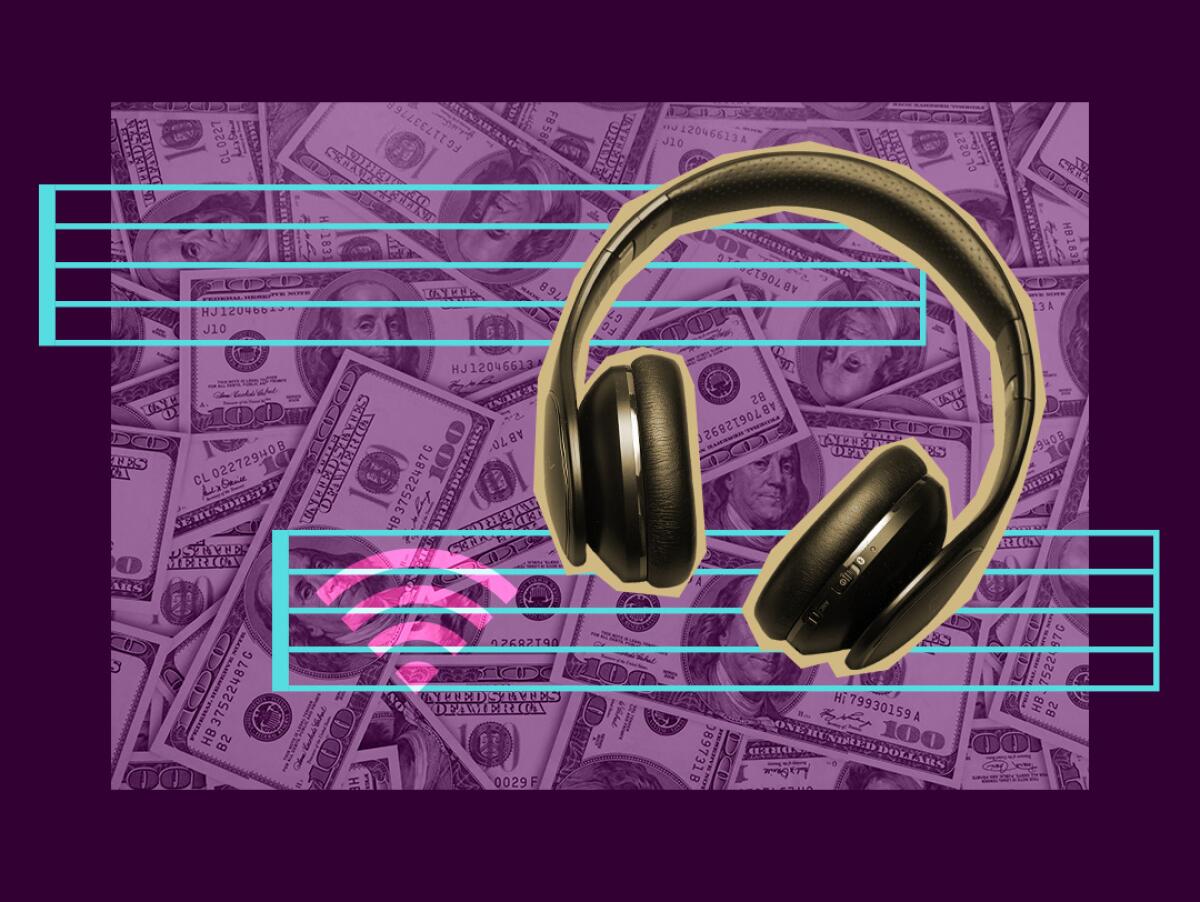Think Hollywood spending is wild? Get a load of the music catalog gold rush

- Share via
This is the Jan. 18, 2022, edition of the Wide Shot newsletter about the business of entertainment. If this was forwarded to you, sign up here to get it in your inbox.
The definition of “overpaying” in the entertainment business has always been a bit squishy. The classic example is Bob Iger shelling out $4 billion for Walt Disney Co. to buy Marvel Entertainment.
Here’s Reuters’ assessment of the financials at the time: “The price tag values Marvel at 37 times its estimated 2009 earnings, and offers shareholders a 29% premium to Friday’s closing price.” When you put it that way, it sounds expensive. Plenty of people doubted it would pay off. We all know what happened after.
So that’s the go-to retort whenever an astronomical valuation for a production company sets off entertainment investors’ Spidey-sense for danger.
Reese Witherspoon’s Hello Sunshine is worth $900 million? Sure, why not. People love book clubs. The Russo brothers’ AGBO (speaking of Marvel) is worth $1.1 billion? Who’s to say Tokyo-based Nexon, which publishes popular free-to-play video games in Asia, is wrong?
If your jaw drops at some of the deals happening during the Hollywood content splurge, get a load of what’s going on in the music business, where every week there’s another gargantuan deal or partnership in the pursuit of buying song catalogs.
The numbers are staggering. Music Business Worldwide estimates that $5 billion changed hands last year as publishers, private equity giants and other investors gobbled up music rights.
Some dizzying headlines have come out. January: David Bowie’s estate sold his catalog to Warner Chappell Music for $250 million. December: Bruce Springsteen sold his songs and master recordings for $500 million to Sony Music Entertainment. October: Apollo Global Management put $1 billion behind Sherrese Clarke Soares’ HarbourView Equity Partners, which focuses on music investments. Private equity giants KKR and Pimco are also in the mix, through partnerships with music firm BMG.
As we wrote last week, music publishing assets are fetching massive multiples: “During the last 25 years, songwriting catalogs generally sold for about eight to 12 times the ‘net publisher’s share,’ or the amount of revenues the songs generated minus the royalties paid out to the performers and songwriters. Today, valuations are hitting 25 to 30 times the publisher’s take, according to industry experts and executives.”
The reasons for the surge are fairly clear. It’s not just streaming on Spotify and Apple Music but also the rise of TikTok and Peloton, which wouldn’t be what they are without licensed tunes. (I know some of you listen to podcasts while working out, which is incredibly weird, but still...) Audiences love music biopics, documentaries on the Beatles and the Velvet Underground and jukebox musicals.
So ... music catalogs to the moon, right? I asked Matt Pincus, a veteran of the music publishing business, whether the catalog valuations were more rational, or less, than what’s going on in Hollywood.
The problem is that, although publishing royalties are generally stable, they don’t tend to grow very fast. A big chunk of publishing royalties are set by the U.S. government. Here’s what else Pincus told me, in a note of caution:
The big-ticket copyright deals you’re seeing right now are for historical catalogs of copyrights that have very stable earnings. In other words, the earnings don’t go down a whole lot. They also don’t go up a whole lot. So if you’re looking at the Fleetwood Mac catalog, every once in awhile you get the guy on the skateboard drinking the cranberry juice that drives the TikTok earnings up in any given year by a lot, but that kind of unplanned thing tends to happen over the life of the copyright anyway, so [it’s] kind of factored in. The average earnings are not going up by multiples over a five-year period of time. So if the price is rational, they’re great investments, because they’re pretty stable. But there’s an upper limit on price....
The thing about the big Netflix talent deals is that people like Shonda Rhimes or Ryan Murphy could be worth five or six times tomorrow what they are worth today if they produce a bunch of hits. On a catalog of already-released songs, you know what the hits are already. The only thing that moves the revenues is broader industry economics. It may be more rational to invest in people that make hits than it is to buy hits that already exist for very large multiples of their historical earnings.
Depending on whom you ask, the music catalog sector could be in the midst of a bubble, or it could just be experiencing a very hot market in a cyclical business. There’s another side that says that people who call out investors for overpaying for music catalogs tend to be proved wrong. Read our full story for more.
Roku gets ‘Weird’

The popular maker of streaming sticks is becoming a bigger player in Hollywood.
A new video app can’t really succeed if it’s not on the Roku platform, which gives it a lot of power in negotiations with media companies.
But the San Jose tech firm isn’t happy with being a mere distributor. It’s bulking up on original content for its free streamer, the Roku Channel, after seeing some success with the orphaned Quibi shows it adopted, like “Die Hart.”
Now it’s in the music biopic business.
Roku on Tuesday announced a new feature film starring Daniel Radcliffe as “Weird Al” Yankovic. The movie, produced by Funny or Die and Tango, will be titled “Weird: The ‘Weird Al’ Yankovic Story” and begins production in Los Angeles next month. It will premiere exclusively on the Roku Channel.
I’d make a joke here, but I have too much respect for the man who made “Amish Paradise.” The news release promises a film that will explore “every facet of Yankovic’s life, from his meteoric rise to fame” to his “torrid celebrity love affairs and famously depraved lifestyle.”
So I don’t know what to expect, but I want to know more. Is Radcliffe taking accordion lessons? If they don’t film the “My Bologna” scene on location at the Cal Poly San Luis Obispo bathroom, will alumni get over the betrayal?
There’s more to come. Roku’s Santa Monica team doubled to more than 200 employees in 2021, Wendy Lee reported last week. To accommodate its larger workforce, the Roku Channel is moving into larger digs early this year. Big question: Will Roku buy a big production company or continue to focus on growing organically?
Read this stuff

— Smoking is cool again? Cigarettes are making a comeback among young people on TikTok, says this New York Times trend piece. “[C]igarette smoking has been in a steady decline among adults in the United States for 30 years.... Yet, in 2020, for the first time in two decades, cigarette sales increased.”
— Peacock wants more Latino viewers. “Seeking to broaden the appeal of its streaming service Peacock, NBCUniversal said Thursday it plans to launch a Latino-focused programming hub, Tplus, on the platform,” Meg James writes. “The new offering, which is scheduled to launch this fall on Peacock, is designed to be a digital extension of NBCUniversal’s popular Spanish-language television network, Telemundo.”
— A Nielsen alternative in the spotlight. Speaking of NBCUniversal ... the media company, which has been sharply critical of Nielsen’s audience measurement data, “is testing an alternative service next month to track viewing of the Olympics and the Super Bowl,” reports Stephen Battaglio. The company will use data from iSpot.tv, a firm that measures audiences across linear TV and streaming platforms.
— These TikTok stars made more money than many of America’s top CEOs. Charli and Dixie D’Amelio and Addison Rae are among TikTok stars who outearned leaders of many S&P 500 companies, according to the Wall Street Journal. Still, the big pay days don’t come close to matching the upper echelon of media and tech compensation packages. Give it time, though.
— Is this the year a documentary finally gets nominated for best picture? With strong contenders like “Flee” and “Summer of Soul,” the documentary format may get the Oscar recognition that has long eluded it, says Vanity Fair.
Number of the week

AMC’s CEO cashed out more stock. Adam Aron sold another $7.1 million in AMC stock last week, according to an SEC filing.
He has sold more than $40 million in stock since November, as shares trade at elevated prices thanks to a very large and excited group of retail investors (THR).
Taking a page from the Elon Musk playbook, Aron explained himself on Twitter, referring to a statement he made in August indicating that he would be unloading shares as part of his estate planning. Now he says he’s done selling. “I am in!” he wrote. The next day, he tweeted that investors would be eligible to claim an “I own AMC” NFT.
Aron has taken the unusual step in recent months of catering to the specific interests of the Reddit-fueled investors by dipping his toe into the Spider-Man NFT space, talking about accepting Dogecoin and Shiba Inu for movie tickets and donating to an obscure gorilla charity. AMC has used the meme-stock cash windfall to buy leases of old ArcLight and Pacific theaters and get into the business of popcorn retail.
How this plays out for AMC is an open question, seeing as the company is still dealing with more than $5 billion in debt. But it’s working out OK for Aron, personally.
Another ‘G’ thang

Love him or hate him, no one tries harder than Kenny G. The HBO documentary “Listening to Kenny G” is a fascinating document, even for (maybe especially for) a non-fan.
Why did a curly-haired saxophonist from Seattle want to make music like this? How did he become the top-selling instrumentalist of all time, a fact that fans are often quoted repeating in the film? By documenting the rise of the easy-listening icon, director Penny Lane’s movie explores the question of what qualifies as “good taste” and who gets to decide.
Inside the business of entertainment
The Wide Shot brings you news, analysis and insights on everything from streaming wars to production — and what it all means for the future.
You may occasionally receive promotional content from the Los Angeles Times.




